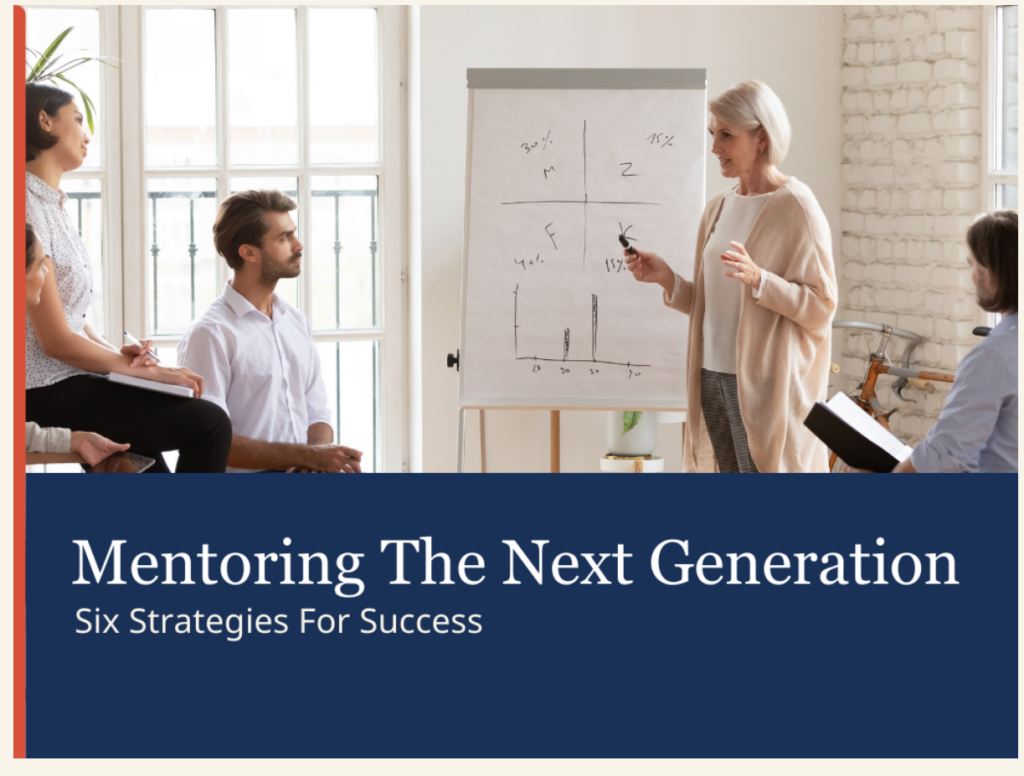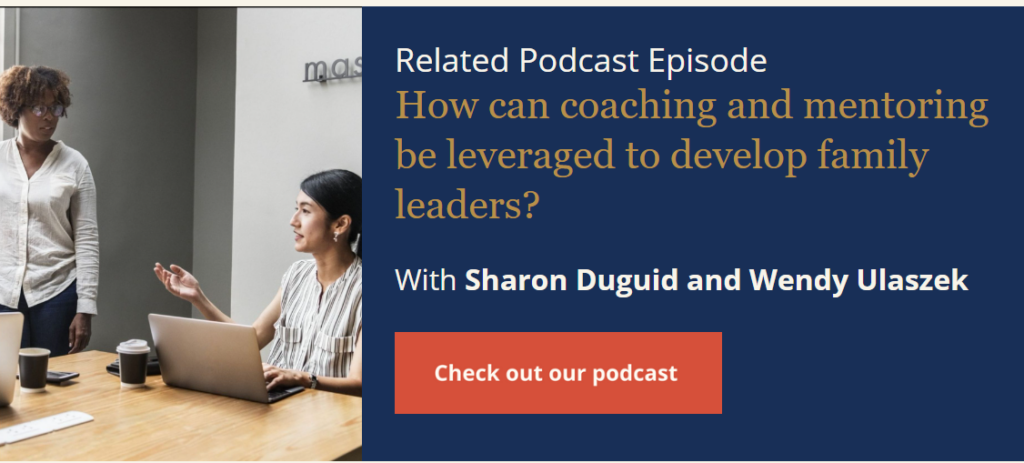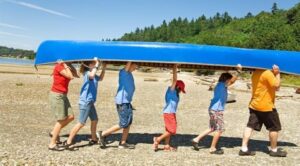Popular news and culture is littered with stories of failed mentorship of the next generation – trust fund kids corrupted by inherited wealth, and young heirs captive to their family legacy while their personal aspirations are ignored or suppressed. And for good reason – these stories and stereotypes frame a subset of very real risks for families as they pursue success across generations, particularly when next generation engagement and development are taken for granted.
In this newsletter, we’ll share six career planning strategies to help key mentors throughout the system—parents, uncles, aunts, grandparents, senior business leaders, and advisors—prepare next-gens for their roles in the family enterprise

Written by Katherine Grady, PhD
Article originally published in the magazine “Families in Business”. June 2002
Michelangelo was once asked how he was able to create the figure of David from an awkwardly shaped block of marble that other sculptors had attempted and abandoned. He is said to have replied simply, “The figure was there imprisoned in the block: I only removed the useless stone around it.”
This story, whether legend or fact, is often cited as a metaphor for the struggle to wrest a mature and authentic self out of the weight of the past – one’s own childhood; family, peer and societal pressures; even one’s cultural, political, and historical foundations.
It is every good-hearted parent’s intention to do whatever they can to help their children free the mature figure hidden within, whether raising children to meet the challenges of a complex world or preparing succession opportunities in a family enterprise.
When it comes to raising children, however, few parents have the sure vision of Michelangelo despite our best intentions. Consequently, all parents need to be clear about our own blind spots and agendas, and more attentive to the developmental needs of our kids. What follows are six ideas that can help parents and mentors track these important issues and more effectively guide the rising generation.

1. Understand career development
Very few children really know what they want to be when they grow up. Asked as a child, a young daughter might say she wants to operate the heavy equipment of the family’s construction firm or a young son wants to answer the phones for his father at work. But given the freedom to explore their fantasies, these answers will change many times as the children grow older.
Additionally, there is often considerable pressure on young adults, both overt and covert, to choose the family enterprise as a career. However, if they are urged to make career decisions prematurely, they may choose a path without fully considering other alternatives that suit them better. They may make decisions because it is what they think their parents want from them (or what they don’t want).
The rising generation needs time away from the watchful eye of the family and the family business to become educated, to explore other career options, to gain skills not found within the family business, to make mistakes or to have the freedom to start over if they need to.
If family mentors can allow each individual to more fully explore their interests and skills at their own pace, then the members of the next generation who decide to pursue a career within the family business will bring broader and stronger experiences back to the enterprise.
The tasks are to teach them about the family business: its history, its vision and its legacy.
2. Educate about the business
An ongoing task is to provide the next generation with as much exposure to the family enterprise as possible early in their career development. The tasks are to teach them about the family business: its history, its vision and its legacy. Early work experiences are also invaluable for those interested in further exploration. For example, summer internships, job rotations, exposure to senior leaders, courses on business and finance, and regular shareholder education meetings are all activities designed to acquaint the next generation with the family enterprise. This is often best delivered by someone other than parents – and is a great opportunity to get other key stakeholders involved.

3. Create a career development committee
Another concrete way of helping them make better career decisions is the formation of a Career Development Committee. The make-up of these committees varies, but a typical group might include a senior executive from the family, a human resources leader, a board member, an outside consultant or educator, and a senior family member outside the business circle. The most important criterion for Committee membership is an ability and willingness to step away from their preconceptions of the young adults, whom they may have known since infancy, and to be open-minded enough to allow freedom of exploration.
In regularly scheduled meetings with individual members of the next generation, Committee Members can provide personal attention and consideration to each person’s unique career formation, advising them on educational choices, work experiences, and future directions.
4. Provide clear criteria
As these steps are negotiated, certain family members will begin to emerge with a genuine interest in pursuing a career in the business. This can be another area where parents and young adults must walk a narrow tightrope. Mentors cannot afford to have their feelings as senior family members interfere with their judgment as business leaders, nor can young adults afford to bring their unfinished family issues into the business. Clear entrance criteria provide checks and balances on possible preferential treatment for less qualified family members and ensure a parity of experience and education with nonfamily candidates. Many families now set entrance criteria that include such requirements as educational degrees in specific areas, a set number of years of work outside the family firm and a certain number of years of industry related experience. Furthermore, clear promotion criteria must be established.
Family members should be required to follow the same evaluation procedures as non-family members and should be measured by similar promotion criteria. Obviously, one of the difficulties in a family business is the perception of preferential treatment for less qualified family members over other qualified employees. Having clear and openly defined promotion criteria and adhering to these standards will assure that the most qualified individuals are promoted, increasing the loyalty and satisfaction of non-family employees, and the overall robustness and strength of the business.
A family enterprise can set up a Venture Capital Committee or Fund composed of senior family and non-family executives to evaluate the requests for investment, objectively weighing the economic and strategic merits of each request much as they would any other business opportunity.
5. Support worthy venture capital projects
In the course of these explorations, some young adults may realize that they are not interested in pursuing a career in the family business, and yet they have inherited the family’s entrepreneurial spirit and talent.
Rather than joining the family company in its second or third generation when the company is more established and highly organized, these members may want to create their own enterprise. In cases like this, a family enterprise can set up a Venture Capital Committee or Fund composed of senior family and non-family executives to evaluate the requests for investment, objectively weighing the economic and strategic merits of each request much as they would any other business opportunity.
6. Provide a range of options for engagement
Though we often think of operational roles as the only way to contribute effectively in the family enterprise, in reality there are many different ways in which family members can engage, each of which will help develop a sense of personal responsibility towards their family legacy. Participation in governance (e.g. Boards, Family Council), philanthropy, and even consistent and active attendance at key functions (e.g. Family Assemblies and Retreats) all support the unity and commitment of the family to the enterprise and support continuity across generations.
We must remember: successful families are not necessarily the ones with perfect matches between the parents’ hopes and the children’s choices.
Shaping the stone
Parents in a family business often tend to observe their sons and daughters in much the same way that Michelangelo would have approached an uncarved block of stone: they seek to discover the possibilities of emerging leaders for the next generation. Who might be the next president, the next dynamic leader of the sales department or the next director of the family foundation? However, the figures that emerge may have a very different shape.
Here, we must remember: successful families are not necessarily the ones with perfect matches between the parents’ hopes and the children’s choices. Rather, successful families are those that find ways to encourage the emergence of multi-faceted adults, some choosing the family business and some choosing other roles, but each with a well-developed sense of responsibility and stewardship for the shared family dream.
Thank you for joining the global community of families who use these insights to support their continuity. We look forward to sharing more with you in the next LGA quarterly!
Sincerely,
Your LGA Team
Download a printable copy of the article HERE








